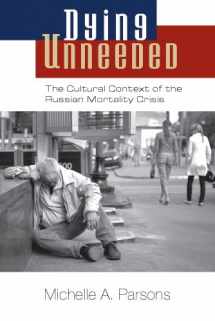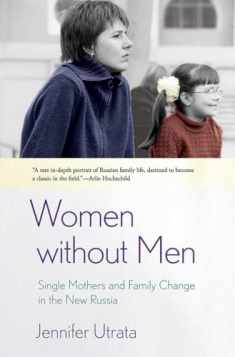
Dying Unneeded: The Cultural Context of the Russian Mortality Crisis
ISBN-13:
9780826519733
ISBN-10:
0826519733
Author:
Michelle A. Parsons
Publication date:
2014
Publisher:
Vanderbilt University Press
Format:
Paperback
224 pages
Category:
Nursing
,
Demography
,
Social Sciences
FREE US shipping
Book details
ISBN-13:
9780826519733
ISBN-10:
0826519733
Author:
Michelle A. Parsons
Publication date:
2014
Publisher:
Vanderbilt University Press
Format:
Paperback
224 pages
Category:
Nursing
,
Demography
,
Social Sciences
Summary
Dying Unneeded: The Cultural Context of the Russian Mortality Crisis (ISBN-13: 9780826519733 and ISBN-10: 0826519733), written by authors
Michelle A. Parsons, was published by Vanderbilt University Press in 2014.
With an overall rating of 3.7 stars, it's a notable title among other
Nursing
(Demography, Social Sciences) books. You can easily purchase or rent Dying Unneeded: The Cultural Context of the Russian Mortality Crisis (Paperback) from BooksRun,
along with many other new and used
Nursing
books
and textbooks.
And, if you're looking to sell your copy, our current buyback offer is $0.3.
Description
In the early 1990s, Russia experienced one of the most extreme increases in mortality in modern history. Men's life expectancy dropped by six years; women's life expectancy dropped by three. Middle-aged men living in Moscow were particularly at risk of dying early deaths. While the early 1990s represent the apex of mortality, the crisis continues. Drawing on fieldwork in the capital city during 2006 and 2007, this account brings ethnography to bear on a topic that has until recently been the province of epidemiology and demography.Middle-aged Muscovites talk about being unneeded (ne nuzhny), or having little to give others. Considering this concept of "being unneeded" reveals how political economic transformation undermined the logic of social relations whereby individuals used their position within the Soviet state to give things to other people. Being unneeded is also gendered--while women are still needed by their families, men are often unneeded by state or family. Western literature on the mortality crisis focuses on a lack of social capital, often assuming that what individuals receive is most important, but being needed is more about what individuals give. Social connections--and their influence on health--are culturally specific.In Soviet times, needed people helped friends and acquaintances push against the limits of the state, crafting a sense of space and freedom. When the state collapsed, this sense of bounded freedom was compromised, and another freedom became deadly.This book is a recipient of the annual Norman L. and Roselea J. Goldberg Prize for the best project in the area of medicine.


We would LOVE it if you could help us and other readers by reviewing the book
Book review

Congratulations! We have received your book review.
{user}
{createdAt}
by {truncated_author}



